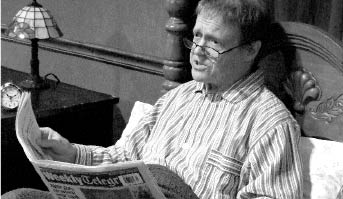Alan Bennet Monologues
by Anthony Chase

The Irish Classical Theatre Company has used the leisurely pace of the early summer to offer two marvelous monologues by Alan Bennett on the stage of the Andrews Theatre. Best of all, they are performed by two of Buffalo’s most accomplished actors, Gerry Maher and Jeanne Cairns, making for a splendid evening of sheer theatrical pleasure.
Playwright Bennett is currently very prominent in the American theatrical consciousness since his play, History Boys, won several 2006 Tony Awards, including Best Play. (He first achieved fame in 1960 as a member of the colossally successful satirical revue, Beyond the Fringe).
The two monologues currently on stage at the Andrews, A Chip in the Sugar and Waiting for the Telegram, are taken from Bennett’s Talking Heads series, two collections of monologues for television that were later performed on stage.
In the first, Maher plays Graham Whittaker, a middle-aged mama’s boy unsettled by his elderly mother’s reunion with an old lover. In Waiting for the Telegram, Cairns plays Violet, a nonagenarian living in a nursing facility while recovering from a stroke and waiting for a telegram from the queen—or to die, as the case may be. Cairns also directed the first play, while Josephine Hogan directed the latter (which also features Hogan’s own daughter, Laura O’Neill, who capably performs the walk-on role of the nurse).
Bennett specializes in exploring the lives of individuals who are unaware of the hopelessness of their situations. He famously uses autobiographical material in his work, particularly his family experiences with mental illness. He played Graham himself in the first set of Talking Heads monologues.
In addition to providing the Buffalo audience with an opportunity to enjoy some of Bennett’s remarkable writing—we may have to wait a very long time to see History Boys—the evening of monologues affords us the opportunity to see two truly remarkable actors. Maher and Cairns are splendid character actors who, too often, are assigned to serviceable roles. Being able to bask in their formidable talent for an entire evening is a great treat.
The monologues are impressive for the complexity with which Bennett imbues seemingly simple situations. The title of the first play is taken from a minor detail that symbolizes Graham’s need for something always to be wrong. When his mother’s boyfriend recommends a stylish restaurant, Graham becomes fixated on the fact that the sugar bowl is chipped. In time, Graham discovers that his rival is, himself, hiding a flaw, which Graham delightedly reports to his mother, bringing her December romance to a decided halt. Graham never analyzes why he is actively working against his mother’s happiness. He bases his self-image on being her caretaker, and his idea of her as frail and feeble is horribly threatened by the renewal of her ancient romance, her reawakening as a sexually vital woman and the arrival of a beau who is Graham’s political opposite. Maher underplays the character beautifully, allowing Bennett’s detached descriptions of emotionally tumultuous events speak for themselves.
Waiting for the Telegram is a tour de force of conflated details. Using the device of the character’s mental impairment from a stroke, Bennett allows Violet to confuse a telegram from the queen celebrating her birthday for the telegram that announced her fiancé’s death in World War I. Similarly, Violet conflates a gay male nurse named Francis with the lover she lost to the war, and Francis’s death from AIDS with the litany of beautiful war casualties. Rescuing the monologue from becoming an AIDS-era cliché, Bennett cleverly juxtaposes Violet’s regret that she did not allow herself to enjoy her young man sexually before he went off to die, with the irony that Francis is killed by a disease that was transmitted sexually.
Cairns handles the monologue with perfection. The performance is by turns poetic, comical and poignant without ever being saccharine.
The evening is a theatrical gift and an event not to be missed.
|
Issue Navigation> Issue Index > v5n25: War Heads (6/22/06) > Alan Bennet Monologues This Week's Issue • Artvoice Daily • Artvoice TV • Events Calendar • Classifieds |









 Current Issue
Current Issue